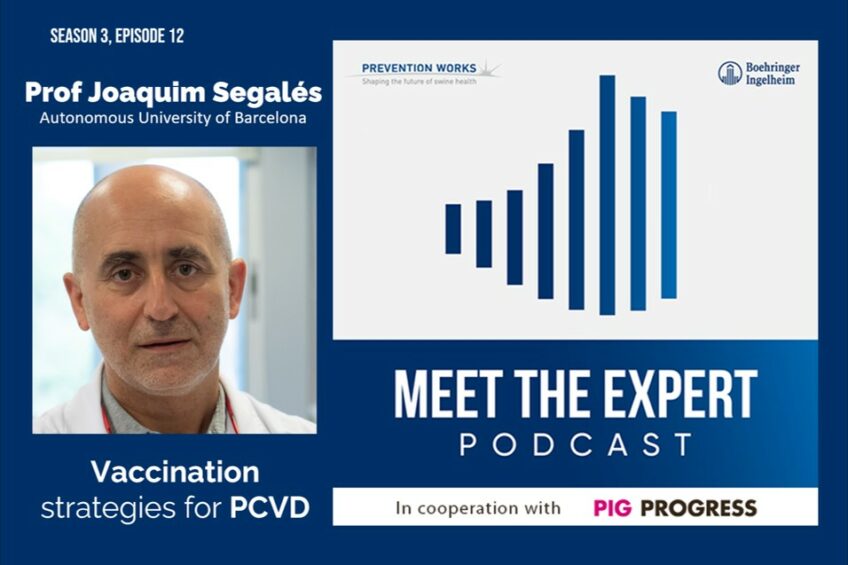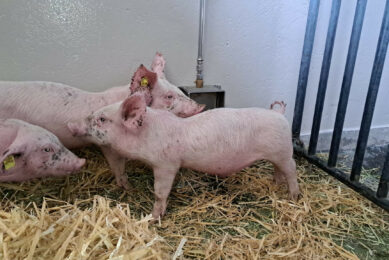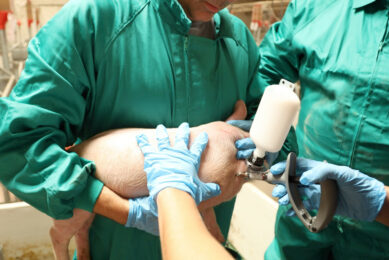Podcast: Vaccination strategies for PCVD

In collaboration with Boehringer Ingelheim, this episode of ‘Meet the Expert’ featured Professor Joaquim Segalés who discussed vaccination strategies and methods to vaccinate against Porcine Circovirus Disease for sows, piglets, boars and gilts.
Segalés, who has been performing research on swine diseases since 1993, is a professor at the Autonomous University of Barcelona, Spain, where he also works as a diagnostician at the university’s research school and is also a researcher at the Centre for Animal Health Research (IRTA-CReSA).
According to Prof Segalés, PCV2 vaccines are excellent vaccines that, if applied properly, work very well in protecting pigs against clinical signs. They do not, however, prevent infection, he noted. “The PCV2 vaccine has been a positive revolution over the last 30 years in that they provide more piglets sold per sow per year, fewer antibiotics, lower mortality, etc.”
The absence of a PCV vaccination programme
This podcast began with a discussion around what might happen to sows and piglets when no vaccinations are administered. If infected, post-weaning animals, especially nursery and early fattening pigs, would display several clinical signs, primarily wasting. Mortality could also be significant, he said. In sows, the issue is not as clear because the first signs of infection are mainly abortions and reproductive problems. Prof Segalés also spoke about how the virus has evolved since its emergence in the 1990s.
A PCV vaccination programme for piglets
Prof Segalés discussed what a typical vaccination programme against PCV2 looks like in piglets, explaining that the best efficiency of PCV2 vaccines is demonstrated in piglets because they are the ones that get clinical disease more often. Vaccines from around 3-4 weeks of age are sufficient to cover – from an immunological point of view – problems that come along with PCV2, says Prof Segalés.
The PCV2 vaccines can be administered with other vaccines at this age, and some vaccines are already ready to mix (PCV2 and Mycoplasma hyopneumoniae, for example).
The duration of immunity has proven to be around 18-22 weeks, which could be the whole production period. Prof Segalés, therefore, believes it is unlikely that the vaccine needs to be repeated unless, he said, those piglets are intended to be gilt replacers.
Sow vaccination programme against PCV
The vaccination of sows is an increasing practice, said Segalés, and many possibilities exist depending on what is practical and feasible at each farm. His choice would be to vaccinate by cycle and before mating. The benefit of vaccination in a blanket fashion will surpass non-vaccinated sows; however, vaccination every 6 months would be preferable.
Gilts and boars
Prof Segalés advised on the vaccination of gilts and boars. Even PCV2 can be shed by semen – the levels are probably not enough to infect sows when being inseminated, though. But it is not the risk of infecting the sows through the semen but rather having a good health programme in the boar herd.
Finally, host Vincent ter Beek asked Segalés what his PCVD vaccination strategy would be. He highlighted vaccinating piglets at around 3 or 4 weeks of age and the sows by cycle. Also, he said, vaccinate healthy animals.











